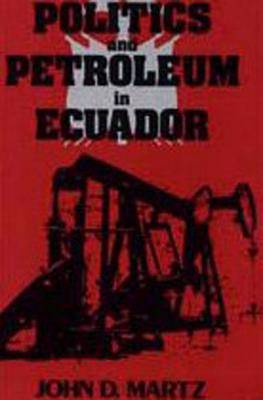
- Afhalen na 1 uur in een winkel met voorraad
- Gratis thuislevering in België vanaf € 30
- Ruim aanbod met 7 miljoen producten
- Afhalen na 1 uur in een winkel met voorraad
- Gratis thuislevering in België vanaf € 30
- Ruim aanbod met 7 miljoen producten
Zoeken
Omschrijving
In 1972 Ecuador began to produce and export petroleum in the Amazon interior, and the formulation and execution of the petroleum policy became central to the political life of the nation. The nation's armed forces seized political power that same year and continued to rule until the reestablishment of democratic pluralist government in 1979. In this book, John D. Martz probes the differences and similarities between military authoritarianism and democratic pluralism through an analysis of the politics of petroleum in Ecuador. The Ecuadorian experience provides an ideal laboratory to test the policymaking characteristics and the overall performances of the two regimes ideal-types. Martz uses a textured and detailed analysis of global oil companies and nationalist politics to trace the growth and evolution of Ecuador's petroleum industry. The course of partisan and sectoral politics and the internal workings of military politics are also examined. Against this interplay of politics and the nationalistic struggle against multinational pressures, Martz compares policymaking under military and civilian government. John D. Martz is a professor of political science at Pennsylvania State University. He is the author and editor of more than a dozen books on Latin American politics and was the editor of the Latin American Research Review from 1975 to 1980.
Specificaties
Betrokkenen
- Auteur(s):
- Uitgeverij:
Inhoud
- Aantal bladzijden:
- 345
- Taal:
- Engels
Eigenschappen
- Productcode (EAN):
- 9780887381324
- Verschijningsdatum:
- 30/01/1987
- Uitvoering:
- Hardcover
- Formaat:
- Genaaid
- Afmetingen:
- 150 mm x 230 mm
- Gewicht:
- 793 g

Alleen bij Standaard Boekhandel
+ 390 punten op je klantenkaart van Standaard Boekhandel
Beoordelingen
We publiceren alleen reviews die voldoen aan de voorwaarden voor reviews. Bekijk onze voorwaarden voor reviews.











